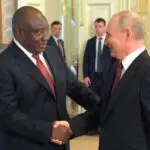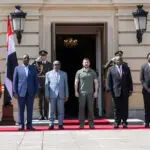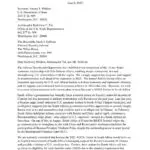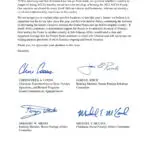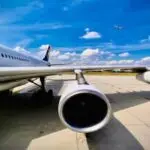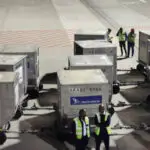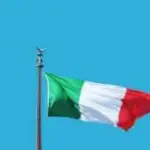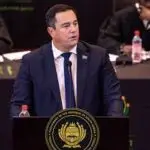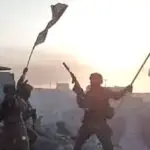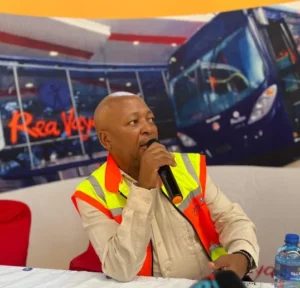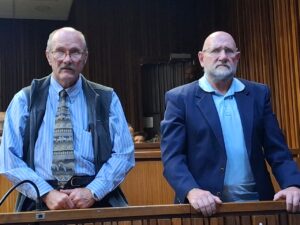By: Clyde N.S Ramalaine
Part 001. A week of foreign diplomacy marked in nightmare of embarrassment for South Africa.
Looking through the review mirror of a week, the script of a ephialtes of diplomacy no one could have written. Undeniably so, this week, an ordeal of foreign and regional relations marks South Africa as a waned star and increasingly attesting to an illegitimate untrustworthy, dishonest player in the toxic world of global politics.
Following on a recent uninvited guest status to the G7, we also know that in July, the USA President Joe Biden will be coming to Botswana for the USA Business Summit scheduled for July 11- 14. Despite Ramaphosa’s institution of an announced Commission on the LadyR docking and sending envoys to the G7 nations, S.A. remains an untrustworthy player in global politics. Its flip-flopping and two-tongue blowing hot and cold, evidenced in the conflicting morning and night talks on its withdrawal from ICC, have painted South Africa as a candidate for discrediting and, ultimately, delegitimisation.
This would begin a week of embarrassment and ultimate humiliation detailing a sophisticated campaign of discrediting South Africa in punitive action for what I would postulate its praxis of ‘pancake diplomacy.’ Pancake diplomacy, which plays on the process in which pancakes are made and how these find the dough at times in mid-air, other times in the pan, puffed, pressed, and ultimately rolled into a wrap and pinned, adopts a theoretical content from the behaviour of states when confronted with the subject of choice between two contending realities, thus exercising an option to strive in appeasement of anti-polar or opposing positions, as a result sending more than confusing signals and messaging to both parties, therefore, losing legitimacy as not trustworthy by anyone.
I would postulate South Africa’s stance on the unfolding armed conflict while portending to be non-aligned, has left its citizens confused and Africa Union, USA / NATO contingent, and Russia/ BRICS groups befuddled. Some may have an issue that one refers to an AU, the USA / NATO contingent, and the Russia / BRICS global family in one sense as paradoxical or opposing groups. We do so for the common denominator being South Africa in its manifold expression of the international state. Yet on closer examination, the better question South Africans must ask is: Do the actions, inactions, flip-flopping, delayed interventions, and mismanaged logistics of SA inspire confidence among AU and BRICS partners in SA as a trustworthy partner?
In this musing, I will present my postulation of South Africa’s foreign relations praxis in this season as identifiable in ‘pancake diplomacy.’ I thus submit my claim for such pancake diplomacy notion to describe the behaviour of states when confronted with anti-polar realities, demands, and loyalties when they choose to strive for appeasement of both, increasingly rendering themselves untrustworthy and dishonest as role players with the ultimate intent of lost credibility, therefore, deserving of delegitimization.
I start with an adumbrated overview and summary of interpreting the events of June 12 – June 19 as a week in foreign relations that laid bare the diminished role of South Africa in an evolving geopolitical setting. It is a week known for the first African Union Mission to visit Ukraine and Russia for the first time in the 16-month-long war. As such, the focus is centred on the AU mission and the designated role players spearheading this mission for peace.
While the peace mission takes the central stage for what occurred in and around such, I attempt to unveil, if not identify, the role players and actions of those active in the discrediting and, ultimately, delegitimization of South Africa, not excluding South Africa’s President, DIRCO, and the DA, and a suspect, Head of Presidential Protection Services, to name a few internal role players.
We attempt to understand the eventful occurrences of this week best understood in an African Union-led mission for talks with Ukraine’s Zelenskyy and Russia’s Putin and what these meant. We conclude by appreciating the notions of success and failure as claimed by the mission and postulate that perhaps the significance of the AU mission is its symbolism. That symbolism is understood in what it may mean for Ukraine’s Zelenskyy and Russia’s Putin and what they seek from Africa, respectively. Ultimately, I advanced this mission as necessary for its historical precedence and pure symbolism and could never have been expected to secure the outcome of peace in a situation where the divides are more significant than ever understood.
In the aftermath of USA ambassador Rueben Brigety’s outrage and accusations, South Africa’s President, as a means of ameliorating, announced a decision to institute a commission to ascertain the full details around Lady R. It is my assertion that Brigety’s statement was well timed and calculated.
The fact that President Ramaphosa could not categorically refute the allegations leveled by US Ambassador Reuben Brigety did not inspire confidence. One would have thought the President would have known if weapons were sold to any country, particularly Russia. Why has Minister of Defence Thandi Modise been silent until now when it should be assumed that she would have been the one to have briefed the President in the event of such a transaction? Ramaphosa’s lack of knowledge sent messages of possible things that could have happened without his knowledge. We know this from the terms of reference of the commission. Such terms aim to ascertain those who could have known about such transactions. This uncertainty of a State leader would for foreign countries suggest a person not in control of his country, let alone its foreign relations. This context, therefore, sends wrong signals to the NATO-led nations.
USA bipartisan lawmakers are seeking to shift AGOA from an SA venue.
One of the first in a salvo of threats the USA resorted to, though not yet in finality but in suggestion, is its AGOA program, of which SA is a beneficiary. In a letter dated June 9, and addressed to US Secretary of State Antony Blinken, Trade Representative Katherine Tai, and National Security advisor Jacob Sullivan, a group of lawmakers from both the US Democratic and Republican parties as represented in first signature by Christopher Coons, Chairman, Sub-Committee on State Foreign Operations and Related Programs, have asked the White House to reschedule this year’s African Growth and Opportunity Act (AGOA) summit that initially had been earmarked for South Africa.
The premise for their request is anchored in their belief that South Africa has shown a pro-Russia stance. Citing two independent incidents, one the landing of restricted Russian cargo aircraft at the Waterkloof Airforce base and two the docking of the Russian cargo vessel at Simonstown, the most significant naval port, in December 2022. The lawmakers contend, “intelligence [USA] suggests that the South African government used this opportunity to covertly supply Russia with arms and ammunition that could be used in its illegal war with Ukraine.”
The lawmakers, among others, assert: “…these actions by South Africa call into question its eligibility for trade benefits under AGOA due to the statutory requirement that beneficiary countries do not engage in activities that undermine United States national security or foreign policy interests” the group said in its letter. It asserted, “…we question whether a country in danger of losing AGOA benefits should have the privilege of hosting the 2023 AGOA Forum.” They thus conclude, “Given the serious nature of these accusations against South Africa and the existing evidence, our bipartisan group of members of Congress currently believes the AGOA Forum should immediately be moved from South Africa.”
Preceded by the May 11 revelations of USA Ambassador Rueben Brigety, in which he categorically accused South Africa of having loaded weapons on the Lady R, which docked in December in Cape Town. This bipartisan request to have AGOA moved from SA as its host is the punitive action the USA is known for if beneficiaries do not toe its line or if they conclude in trustworthiness on the part of program beneficiaries.
DA’s Alan Winde visit to Washington, another orchestrated embarrassment in aid of the discrediting SA.

We also know that DA Shadow Minister of Finance Dion George shared how a recent top-level opposition party delegation implored Washington to renew its special trade agreement with South Africa, notwithstanding the posture of South Africa in its perceived alignment with Russia. In reference to South Africa’s alignment stance with Russia, George said, “…that is causing a great amount of unhappiness amongst our Western allies, obviously, specifically the United States, because the situation in Ukraine is causing a global catastrophe. So South Africa fraternizing with Russia… has not found favor with Congress in the United States. Now, they are the people who will decide whether to renew AGOA, which is the special trade agreement that we have with the US.” George continued: “It’s not reciprocal. It gives enormous benefits to South Africa and the region. And the US Congress is basically asking itself the question as well, when it comes up for renewal in 2025, ‘why on earth should we continue giving a special deal to South Africa when it’s behaving in this way?”
The DA’s contention against such an expected decision on the part of the USA, as captured by George, leads, “…we (the DA) were saying, ‘look, if you take AGOA away, it’s like sanctions. And then what happens is the government actually doesn’t suffer because they’ll sort themselves out. It’s the ordinary South Africans that are already battling to put food on their table that will suffer. So just remember what your target is, in fact. So if you want to hurt the government, don’t do it that way. Do it another way.”
On Tuesday, June 13, news broke that Western Cape Premier Alan Winde was in the US to meet senior officials to save the African Growth and Opportunity Act amid fears that South Africa may be kicked out of AGOA. In an attempt at clarifying his presence in the USA on the subject matter of AGOA, Winde said he was not in the US representing the province of the Western Cape but believes AGOA is crucial for the economy of South Africa. Legally and diplomatically, Winde cannot have an audience with the USA on a state-to-state subject matter such as AGOA.
It is given that South Africa is a unitary state, and foreign relations remain the competency of the national state and are not devolved to any other sphere of government, be that Provincial or Municipal. Understanding why the DA who runs the Western Cape could send a delegation to the USA despite not being constitutionally endowed with the privilege to engage on national matters, one must ask: Was the DA officially entertained, who entertained the Winde delegation on its save-AGOA-SA voyage? When we appreciate these questions, we will understand how disrespected a South African portends for the US government.
While DIRCO was hyperventilating and fuming over the arrogance that details a DA’s Winde-led team and its embarrassment, another leg of the humiliation of South Africa was about to unfold.
Did the presence of SA president Ramaphosa’s head of the Protection Services Unit, Major General Wally Rhoode, contribute to the discrediting of SA and the AU mission?

The adage ‘All politics is local,’ made famous by, among others, USA Speaker Tip O’Neill involuntarily comes to mind on seeing Wally Rhoode’s face as the African Mission’s self-appointed chief spokesman, at least on the impounded SA presidential aircraft. Journalists on board the stuck aircraft stranded for 26 hours at Warsaw Airport captured Major General Wally Rhoode, strangely still the head of Presidential Protection Services, becoming the leading actor in this soap opera of a fiasco of ill logistics planning on the part of SA’s DIRCO.
Major General Wally Rhoode, Head of the Presidential Protection Services, and President Ramaphosa are facing a criminal case that former Commissioner of Correctional Services Arthur Fraser opened more than a year ago—on June 5, 2022. Rhoode, who is central in several irregularities on the alleged Phala Phala crimes. Rhoode violated international protocols to pursue those who stole Ramaphosa’s foreign currency stashed in couches and mattresses in Namibia. Rhoode, accused of bribing those tortured at the Phala Phala, was not the critical spokesperson and the face of SA diplomacy. My question to a few journalists remain, they had unhindered access to Rhoode on the plane for over 40 hours. Why did they not engage him on Phala Phala and sought for clarification as to why he was still the head of Presidential Protection Services?
Head of the Presidential Protection Security team Wally Rhoode lamented claims of racism against Poland for not allowing the South Africans to disembark. Rhoode would spit accusations of racism and sabotage, riddled with emotional blackmail, dovetailed with ambivalent acknowledgments that all paperwork was not in order. Whether the Polish are racists or not is perhaps not the subject and should not be made the subject of escapism.
We warrant knowing if South Africa and, in particular, DIRCO complied with all necessary requirements for the trip to visit Ukraine and Russia and, if necessary, if clearance for all aboard was obtained. If not, we dare not hide behind explosive subjects of racism to cover up for DIRCO’s failure to get the necessary clearance. Did South Africa not delegitimize itself with Ramaphosa and Rhoode, whom the world knows as suspects in a criminal case, yet to face the case involving millions of foreign currency, which the NPA continues to drag its feet a year later?
Seeing the conflicted face of Presidential Protection Services head, Major General Wally Rhoode emblazoned on international and local television screens could not have inspired any confidence but aided South Africa’s discrediting.

In the heat of the impounded aircraft, with journalists and PPS staff now very uptight, Presidential spokesperson Vincent Magwenya in his usual extraordinary need to be also in the limelight, told South Africans everything was going very well with the mission until journalists called him out. He also was accused of peddling lies about not hearing anything of missiles. His now infamous tweet, ‘Strangely, we didn’t hear the sirens or explosions,” caused consternation and, in a sense, also discredited the AU mission, at least in the eyes of those who make up the NATO group. Magwenya suffered public humiliation and backlash after casting doubt about the Russian missile attack in Kyiv. Prominent foreign correspondents, officials, and analysts labelled his tweet ‘deliberate misinformation.’
Part 002: What could the Warsaw impounded SA Presidential support plane mean?
It is essential to appreciate the uniqueness of South Africa’s President for the contingent of journalists representing the media to accompany this historical moment of an AU mission. From the admission of the journalists, they were brought along to witness and report on the actual peace mission with its twin stoppage cities of Kyiv and St. Petersburg. We read nowhere of other 6 African leaders being subjected to the same embarrassment of having had their planes and security personnel grounded at the Warsaw airport. We read nowhere of any other member of the AU mission inviting a contingent of media to this occasion. We thus must accept that the choice and preference of SA President Ramaphosa to have a media contingent accompanying him was in the interest of public relations, something akin to Ramaphosa.
It was going to be Ramaphosa’s moment in the international limelight, and he was going not to miss that for anything; hence he may have heeded the advice of his truth sayers that it was time for mega-media presence watching him in action. When we hear Minister in the Presidency Khumbudzo Tshaveni lamenting the lessons they have learned for taking media with them, it must be understood that presidential public relations have gone horribly wrong. When I contend the campaign of discrediting South Africa, detailed in various roles, this plane full of media to capture the apparent messiah of negotiations makes up part of that. This furthermore details my assertion that we have internal role players in this discrediting and delegitimising of South Africa, and President Ramaphosa, for his love of the limelight and public relations smokes and mirror appetite is, unfortunately, one of those.
Was denying access to SA Presidential aircraft in Italian airspace a mistake or the incompetence of the organizers?
According to Times Live reporter Amanda Khoza who was part of the contingent of journalists aboard the impounded aircraft, “The flight with more than 120 people on board, left SA around 1.30 am on Thursday and experienced problems two hours before arriving in Warsaw. The flight was flagged in Mediterranean waters after it failed to get clearance to fly over Italian airspace. The plane flew around in circles about six times before it resumed its flight on the route to Warsaw. The flight eventually landed at the Warsaw Chopin Airport in Poland at about 1.18 pm. While on the flight, the Presidency tweeted that Ramaphosa had arrived for his working visit to Poland and Ukraine. The journalists on board were told there were “issues” with the plane meant to transport them to Rzezouw as the “chartered flight had not arrived.” An hour into the wait, they were told that Ramaphosa had departed in his jet, named Nkwazi, to Rzesouw to make his way to Kyiv, Ukraine. South Africans would later hear that the plane was not supposed to go to Warsaw but was not cleared to enter Italian airspace. From the surface look at this, it can be deduced that the logistics concerning this trip remain suspect and teetering on precariousness. Why was clearance not obtained to enter Italian airspace? Does entering Italian space detail an anticipated landing in Italy?
Suppose the idea of a denied Italian landing was accurate. Are we to surmise that Italy as a member of the European Council and NATO was oblivious to the African peace mission, or shall we accept that Italy was doing its part in the sophisticated unfolding campaign of discrediting with ultimate delegitimization of South Africa? Punishment for its insubordination with NATO-led nations’ agenda and quest to have the whole world against Russia as the perpetrator in the armed conflict unfolding on Ukrainian soil.
It is difficult to assume that Italy was oblivious to the noble intentions of the African peach mission team and, therefore, committed an error in not extending the South African plane to fly into its airspace and or land in its confines. Interestingly, Ramaphosa, upon landing in Poland, first paid a courtesy visit to Polish President Andrej Duda. Now if the South African President was paying a courtesy visit to Duda, and yet the guest’s support aircraft, protection services, and necessary weapons remain impounded in Warsaw, Poland, with no diplomatic relief or intervention, we must ask, is this not Poland playing its part in delegitimizing South Africa?
Part 003 . Were the African Union leaders’ peace missions hijacked to legitimize Bucha as a Russian-inflicted massacre? – Is there any meaning to derive from the claimed missiles fired during the day of the AU leaders visit?

We do two things in this section, marked as part 3 of the musing. Firstly we explore the meaning of the Bucha visit by the AU mission; secondly, we also engage the discourse of missiles claimed to have been raining down on the actual day of the AU Mission’s visit.
The loss of lives in any war or armed conflict situation remains deplorable since we must advocate for a morality in which all lives are sacrosanct. Yet, Bucha, as the site for the alleged massacre, in which Russia is accused as the perpetrator, is not without question. Questions only a proper investigation can clarify.
Upon the first visit to Ukraine, African leaders were taken to Bucha. Bucha, located west of the City of Kyiv, is the site of an alleged mass grave underscoring the atrocities in the early days of the war in February 2022. The seven, including South African President Cyril Ramaphosa, visited a mass grave for allegedly 458 people killed at the start of the conflict. The world saw African leaders with red memorial candles outside the church, paying homage to those reportedly killed in Bucha.
Also included was a photo exhibition showing grisly images of bodies found lying in the streets after the Russians left. Zambian President Hakainde Hichilema, a known Ukrainian supporter, expressed himself at the site: “Life is universal, and we must protect lives – Ukrainian lives, Russian lives, global lives. That’s important. To protect lives and focus on development.” Egyptian Prime Minister Moustafa Madbouly said, “We pray to God that things will be stabilized and, of course, you return to your normal life.”
One is involuntarily drawn to compare Bucha and Racak, a town in Kosovo. Reading the official transcript of the International Court Tribunal of Yugoslavia (ICTY) hearing which is available on the official website, presents an opposite side as argued by the defense of Slobodan Milosevic on the Racak massacre. Racak is the city in Kosovo, where on March 26, 1999 – 48 Albanian civilians, including many children, were allegedly killed. It was claimed that this took place at the hand of Milosevic.
For those who care to explore the ICTY hearing, The late Serbian leader Slobodan Milosevic, charged with the crimes of genocide in his cross-examination of witnesses, contended and ultimately proved Racak as a staged crime. One of the issues Milosevic’s defense raised was the absence of blood on the actual soil where the claimed crimes were committed. Meaning the bodies were moved to the area. Also, the defense questioned how the conclusion and ratification of sanctification as a Serbian crime was reached and communicated even before any due investigation had been launched.
The similarities are striking if one compares what happened in Racak to what occurred in Bucha. Bucha, like Racak, was publicized the world over as the crime of genocide Racak, therefore, presented a pretext to bomb Yugoslavia. In this sense, shall we ask if Bucha became the justification to supply weapons to Ukraine since Bucha, a massacre detailing 458 deaths, would be advocated as the worst crime since World War II?
In both cases, too many strange things are not explored and explained. Yet there still needs to be an international investigation. Some of the African leaders looked somber at being handed the candles. Ramaphosa looked gaunt as if to say this visit of
We need to ask whether Bucha was part of the original plan as the African Peace Mission intended, or were they upstaged and directed by Ukraine’s Zelenskyy to go to Bucha? From the appearances of some in the delegation, particularly Ramaphosa, who looked rather gaunt at having to go to Bucha, it is not easy to appreciate if Bucha was originally part of the planned visit. Suppose the African delegation did not intend to visit Bucha, meaning Zelenskyy redirected them to pay homage. Can it be argued that they became the justification for a claim of Bucha as a Russian crime scene? There has yet to be an investigation with definite outcomes on Bucha as to what happened there.
Suppose it is argued that the African leaders’ peace mission was hijacked and humiliated all at once by being brought to Bucha. Was this not the worst humiliation served upon the African presidential delegation? This issue’s significance may only be understood when an official investigation ventilates it, as in the case of Racak of Kosovo.
Is there any meaning to derive from the alleged missiles fired during the day of the AU leaders visit?

The 16-month-long armed conflict between Russia and Ukraine for who is involved has taught us to appreciate the power and role of media and how much both sides rely on propaganda to make their self-truths stand.
Upon the arrival of the African Peace Mission leaders in Ukraine, they heard of missiles that were fired. The air raids are a rarity for their daytime occurrence since they usually would be night-time based. According to preliminary Ukrainian reports, 12 missiles detailing a mix of calibers were launched by Russia from the Black Sea. We are told Ukraine brought these down, and shortly afterward, the all-clear signal was sounded, and the preliminary. Reports of damage in the central district and further north, likely due to falling debris, were relayed. No actual missile impact or any casualties were reported.
Any follower of the armed conflict between NATO and Russia, with Ukraine as its geographical node, would know it is characterized by mass propaganda. It is an armed conflict or war often defined by what I will call the ‘war of propaganda.’
The idea of who is responsible for the missile strikes, at least in Zelenskyy’s claim, is that Putin is not in charge of his army…since Ukraine was being struck at the time of the African leader’s visit. Therefore, hearing about missiles fired on the day the African leaders arrived in Ukraine in this convoluted and toxic propaganda-led war could suggest one of two scenarios. It could have been Russian or Ukrainian. We have heard these two parties accuse each other of such.
For its part, Ukraine could have fired those missiles to convince African leaders of the aggressor status of Russia. Ukraine also could have launched this missile to earn the sympathy of the African leaders, showing their seeking to persuade them of the dishonesty of Russia. Ukraine could also have fired the missiles to show African leaders that Russia has no respect for their peace mission, hoping they would cut their trip short and refuse to visit Russia. Where any of the missiles landed still needs to be known precisely where they were in impact Ukraine is yet to tell; until now, its claim is downing the missiles.
On the other hand, Russia could have fired the missiles to express its disdain or made-up mind since Ukraine, two days before the arrival of the African leaders, launched attacks on Russian areas and had not stopped. The idea of a possible Ukrainian self-inflicting missile incident could be borne out by the attitude of Zelenskyy, who is on record to have expressed his frustration and confusion on why the African leaders were planning to visit St Petersburg still. Zelenskyy made no bones that there was nothing rational in the intention of any further mission than Ukraine. Perhaps this attitude of Zelenskyy must be understood against the backdrop of NATO supporting presidents and leaders only visiting Ukraine and declaring their undivided loyalty to Ukraine, identifying Russia as the aggressor. However one may interpret or make sense of the reported missile issue, one cannot rule out the possible disrespect of Ukraine and Russia for the Ramaphosa-led African Mission.
Part 004: What did Zelensky and Putin Respectively hope and achieved with this AU Mission ?
We now focus on how Zelensky and Putin engaged with the AU leaders and what their respective political strategies and tactics could have meant.
Did Zelenskyy’s tangible agitation and somewhat instruction to the African leaders on their Russian visit communicate his disrespect for the delegation?
Watching Zelenskyy and appreciating his tone in his deliberations with the African leaders presented one with questions about his respect for the mission. This suggests we ask for the strategy he may have deployed. Let us hear Zelenskyy’s firm instruction to the AU mission in his own words, “To allow any negotiations with Russia now while the occupier is on our land is to freeze the war, to freeze everything: pain and suffering.”
As earlier alluded to in part 003, the deployed tactics of an alleged daytime missile strike, an unusual occurrence at the time of the AU Mission’s visit, may have detailed part of a tactics toolbox. His tactics extended to hijacking the AU Mission to visit Bucha to legitimise the claim of a massacre in the first month of the armed conflict. Thirdly, by appealing to African leaders to convey the release of children and captured soldiers, Zelenskyy was now completing his picture depicting Russian and Putin as the gross aggressor.
To appreciate what Zelenskyy’s strategy in sum-total informed by his deployed tactics was, we must hear him when he contends he sees no logic in African leaders experiencing and witnessing these missile attacks and yet being of the mind to visit St Petersburg to meet with the Russian President. Zelenskyy clarified his demands that African leaders ought to convey to Putin. “Real peace is needed, and, therefore, the real withdrawal of Russian troops from our entire independent land.”
In the first instance, Zelenskky’s strategy could have included his intention to flex his muscle on home ground base, a plan to make African leaders understand he tried to speak with them but was ignored while the whole old west took him seriously Africa was dilly-dallying and flirting with Russia. While we are not privy to the talks, it is easy to conclude that Zelenskyy was using the opportunity to flex his power and respond to African leaders whom he long ago sought to meet with but was given the proverbial stiff upper lip. They were now in his territory and not going to dictate to him their infamous list of ten items detailing a conflicting wish list strung together admittedly from the inputs of others who visited. Zelenskyy was somewhat indifferent to the AU mission; after all, they gave him no support in either capital or artillery.
Did a prepared Putin have as a strategy for lecturing the AU mission on their schizophrenic human rights mission discredit the mission?
With the first part of the African leaders’ mission done, they finally arrived in St. Petersburg. We warrant asking what the strategy of Putin would have been and what tactics he was going to deploy since we all know this is about political advantage. Those who appreciate posture and body language could not see a palpable and marked difference in reception between Ukraine’s Zelenskyy and Russia’s Putin.
Putin, a seasoned strategist, and tactician, shared broad smiles, hugs, and almost an overfriendliness to the delegation. Meaning Putin’s strategy was to confirm to the NTO opposite side that these are my friends and comrades. This act on the part of Putin may have set the African leaders up because whoever watched this ‘friendliness’ from the NATO side could only conclude that the African Mission in representing leaders attests to a group deep-in-bed with Russia. The reception venue was also more presidential, and Putin knew all heads of state never forget they are significant and want to be treated cognisant of this reality. Compared to where the AU mission met Zelenskyy suggesting Putin rolled out the red carpet for his friends and comrades is not far-fetched. He would welcome and allow them to present their reason for the mission.
Ramaphosa, as in the case of Zelenskyy, would read out the now infamous 10 points detailing the African leaders’ mission. Ramaphosa indicated that the war must be ended. Yet he, as in the case of Ukraine, was bearing a message from Africa on the impact of the war on exporting grain from Ukraine and fertilizers from Russia. In this sense, Ramaphosa carried the lament of the African content concerned with food security as the armed conflicts have a direct and primary impact on the continent.
Unfortunately, the African delegation did not expect a shrewd and clever politician to take his time to lecture them on each of their ten points. To flex his muscle and show his authority, Putin interjected and determined to enlighten his friends and comrades who, n the name of peace, human rights, and grain and fertilizer placemats, tabled their requests. Putin would now give them a historical lecture on the conflict as a reality, with critical intervals of 2008 and 2014 as key moments.
It was as if the African leaders were now sitting in a Politics 101 class. On peace, Putin presented agreements initialled and yet stalled by some NATO-led teams, rendering them as not serious about working for an amicable resolution of the conflict. As in the case of Zelenskyy, Putin was adamant that Russia’s conditions stand and will not be disrespected.
While Zelenskyy appeared less interested in hearing the laments of African presidents on the impact of the war on the continent’s grain and fertilizer imports. On the other hand, while the issue for Putin may not have been a central matter, he did express a readiness to dispatch grain and fertilizer to Africans free of charge.
He would go as far as to point out Russia’s readiness to have the war ended and how at a critical point in the war, Ukraine’s Zelenskyy was ready to append his signature to end the war, yet Boris Johnson, then UK prime minister made a hasty visit to Zelenskyy discouraging him from entering the agreement that would have led t the cessation of fighting. With this, He would lecture AU mission participants on a NATO less serious about ending this war but hellbent on humiliating Russia. He would point to the peace proposal of China’s Xi Jinping, which Zelenskyy rejected under the pressure of the USA.
That both Zelenskyy and Putin, respectively, had a particular strategy aided by an arsenal of tactics employed to convince the AU mission is undeniable. The jury may be out as to whose strategy worked and which tactics won the day. It, however, would not be wrong to contend Putin won the day as the one more serious about ending the war given the historical narrative of the armed conflict in predecessors of events from 2008, with a high point in 2014 and the ultimate February 2022 moment.
Ultimately, it does not take rocket science to accept that both Zelenskyy and Putin found the AU mission untrustworthy and resorted to their respective strategies with that as their separate yet conjoined realities.
Part 005 : Should the recent African Union mission to Ukraine and Russia be framed as antithetical success or flop discourses?
In this concluding portion of our musing, we endeavour to engage the critical aspects of assessing the AU mission in frames of success, grotesque flop and claimed impact.
Opinions on the success or impact of the AU mission to Ukraine and Russia, as led by seven presidents in representation, vary. Some regard the African Union mission of African leaders to hear out both sides as a complete failure and flop. Last Sunday’s City Press on the front page, as penned by Pieter Du Toit, screamed ‘CYRIL AND THE GREAT PEACE FLOP.’ While Du Toit raises several issues, essentially around the logistics he experienced as part of the media contingent, his main gripe is the subject of fruitless expenditure, which he wants the President to answer.
We hear the same ill-conceived and misplaced rhetoric and threat from the DA’s leader John Steenhuizen when he, in the convenience of transparency, threatens to want to know about every weapon on board the 26 hours Warsaw impounded Presidential aircraft. We warrant ignoring this attention-seeking of Steenhuizen since it depicts his wilful ignorance to appreciate that it is a standard international practice that heads of state, when they travel both locally and internationally, are entitled to armed security for their safety. Why Steenhuizen seeks to make this his focal point for a political campaign attests to the shallowness of opposition politicians who assume opposition means opposition against any and everything anytime and anywhere.
Since Steenhuizen publicized his intention to approach Minister of Police Bheki Cele on the subject matter, we may advise the minister to pay attention to the official Opposition leader on this matter. The DA’s Steenhuizen, known for his inward-looking politics, is yet to share with South Africans what the AU mission means less in shades of discrediting SA but in the objectivity of foreign relations in which the AU and SA are role players, regardless of how one may want to deny this.
On the same score, we are yet to hear the EFF articulating its appreciation and critique for the AU mission other than lamenting Ukraine as racist and the safety of the President. The state of opposition politics in SA often confirms the absence of South Africa as an AU Member and player in a global setting. South Africa deserves to hear all opposition parties constructively engaging the meaning of the AU mission and what lessons could be learned from it.
On his part, the South African President describes the AU mission as ‘impactful,’ meaning having a significant impact. We dare not pretend or assume to know what Ramaphosa means with his word choice of impactful, and he too warrants explaining himself on such. If we are to engage impactfully, we will need to ask about impact in what sense. It is a given that the AU Mission, in the singularity of the trip, was never going to convince either Zelenskyy or Putin; therefore, success, understood in ending the war, could never have been its sensible expectation.
It is misplaced to speak of the AU Mission in conclusive binaries of success, ‘impact,’ or failures. Instead, I will propose we should identify what I will postulate as the ‘symbolism’ of Africa’s contribution and role in working for peace among East-European nations involved in a 16-month-long war-setting. Therefore, the importance or irrelevance of the AU mission is measurable in its symbolism.
It is crucial to start by saying that while seven African leaders – the presidents of Comoros, Senegal, South Africa, and Zambia, as well as Egypt’s prime minister and top envoys from the Republic of Congo and Uganda – visited Ukraine on Friday as part of a self-styled “peace mission” to both Ukraine and Russia made the trip, it was an AU mission, and that must not be lost in the translation. The symbolism for the AU mission is derived from this bedrock. In the rightful disillusioned minds, South Africans, beset with the challenges of a Ramaphosa leadership that represents the antithesis of transparency and accountability, must be forgiven for its pessimism. Yet, in our haste, we dare not reduce the AU mission as a mere tactical ploy of Ramaphosa to escape his myriad domestic and international image challenges. The initiative is justly registered as AU-initiated and led.
The importance lies herein that Africa as a continent and the AU as representing the nations of Africa until this mission, given its complicated dualism of voting on the said resolution, is yet to present the evasive uniform position that some would have hoped from the AU. Also, no African state, including the African Union, had until this mission visited Ukraine. While most NATO-affiliated leaders have either hosted or visited Ukraine, Africa has yet to do any of that. Ukraine has been a benefactor of arguably the most extensive financial support and military assistance; for the record, none came from Africa or any African state.
It is fair to conclude that Ukraine’s Zelenskyy never expected any financial and artillery equipment in supplies of support from Africa; instead, it expected what may be termed emotional and sympathy support, particularly since Russia is registering a presence in Africa. The sympathy vote Zelenskyy was appealing for from Africans came wrapped in a purported shared victimhood of disenfranchised human rights, which Africans are particularly sensitive to.
Zelenskyy had hoped to appeal to their African consciousness of suffering at the hand of a superior nation. Zelenskyy, in a sense, was leaning on the pain of colonialism inflicted upon Africans and the impact of such. From the bedrock of this historical reality, Africa, for Zelenskyy, could be persuaded to choose against Russia, rendering the latter a pariah state. The symbolism of the visit was the hope Zelenskyy may have had for securing that sympathy vote. It is again here where the unusual presence of missiles in the daytime on the day of the AU mission’s visit to Ukraine and the plausibly calculated Bucha visit become essential. It is against this backdrop that Ukrainian President Volodymyr Zelenskyy could have urged a group of African leaders to ask his Russian counterpart Vladimir Putin to free political prisoners from Crimea and beyond, saying it would be an “important step” during their trip to Russia on Saturday.
If one contends for the meaning of the AU Mission for Ukraine as outlined, we must ask what this AU Mission meant for Russia’s Putin. If Zelenskyy had hoped to sway Africans with the unusual daytime and possible self-inflicting missiles and a visit to Bucha, Putin, was welcoming friends and comrades. As comrades, Putin would appeal to Africa as present in the AU delegation, including those absent. He would now have his opportunity to, in an unbridled sense, make his case for the armed conflict, which, contrary to armchair commentators, did not start in February 2022 but must be understood again the nine-year-long injustice and shelling served upon the Deonetsk People’s Republic and the Lugansk Republics. He would particularly remind his African comrades that, effective since 2014, these republics have been subjected to shelling in which life has become abnormal and the ethnic hatred tangible. Putin was going to remind Africans that Russia has raised these matters in the security council on the plight of the people from these areas as victims of Ukrainian inhumane violence.
Putin would not miss the chance to remind his African friends and comrades that they remained silent for nine years of this atrocity and injustice. He would have reminded them of their ongoing silence since the Ukrainian shelling in the Donetsk and Lugansk areas. He would have reminded them that Zelenskyy’s predecessor is on record to have declared the future of the children of the republics mentioned above as that of the underground since the shelling would never stop until they all smoked out.
He would not have missed the chance to respond to Zelenskyy’s quest to free the prisoners and for the children to be returned. Putin would have explained to his African comrades that the rationale for the children in Russia’s possession was an act of social welfare and care, and it was never the intention to abduct the children, hence Russia’s readiness to release the children back into the primary supervision of the due caregivers. Yet he would have implored Africa to ask Zelenskyy what about the children of Donetsk and Lugansk, whom Zelenskyy is on record to have until now denied their human agency, insisting on labelling them as species.
The symbolism of this meeting with Putin resonates in that he would assist African leaders to make up their minds, particularly those on the side of Ukraine, by keeping them accountable for their wilful silence. He was going to remind them of their silence, yet now his presence confirms a contradiction. Not only was he going to embarrass his BRICS comrade Ramaphosa who has been dilly-dallying as if in two minds, but he was going to say Africa has no excuse anymore and cannot hide behind neutrality when neutrality dictates the biggest form of partiality. If Africans were here to plead for grain and fertilizer shortages in the hinterland, they would not escape knowing the real reasons for Russia’s reaction in February 2022.
Furthermore, the symbolism of this event is accentuated in the fact that international relations peace missions in typical war spaces, such as between Russia and Ukraine, for their sensitivity, while reported, usually adopt a low-key format. Suggesting it is less glaringly in the public eye, the AU mission could not have been more public. One almost gets the sense that the AU Mission was covered as demonstratively public. It was almost as if the agenda of discrediting and delegitimization demanded the public humiliation for a truant Africa and its leaders who until now have been arrogant not to toe the line to support NATO-led/Ukraine against Russia uncritically. We warrant asking if making this AU mission ultra-public was essential. What was the agenda behind such, if not embarrassment and humiliation?
The African Union mission is also important for a historical record that Africa did not sit silent but attempted to do its part to assist in brokering peace in a European setting of countries. Was the recent African Union mission to Ukraine and Russia a success, or was it a flop?
The African Union mission is also crucial for the future as a historical record that Africa did not sit silent but attempted to do its part to assist in the brokering of peace in a European setting of countries. Assessing the AU mission against the backdrop of conflicts on the continent, such as Sudan or current Ethiopian challenges, is a misplaced assessment.
In this sense, the AU mission is historic in the life of the war that started 16 months ago.
The African leaders’ Mission to Ukraine and Russia, notwithstanding the challenges and what I deem an active delegitimization campaign, cannot be rendered a failure but completes the role of Africa in a vacillating and shifting geopolitical space.
I want to concur with Foreign Relations and AU specialist SARChi and African Diplomacy Chair Chris Landsberg when he contends the trip’s success, perhaps because it confirmed how far apart the opposing parties NATO/Ukraine and Russia are. Therefore, if the AU Mission helped us to understand anything, we must appreciate that this war will not end anytime soon, and we are all in for the long haul. We have long concluded that miscalculations as to how long this war will drag on were made on both ends.
Thus, the African Union Mission is important for the AU and Africans to identify as part of the bigger puzzle of a rapidly evolving multipolar geopolitical space and its precarious and jagged-edged choices. The AU mission is essential since it underscores the reality that all conflicts ultimately warrant settling. While we may not have confidence in diplomacy, we deserve to hear John F Kennedy reminding the USA and perhaps all, ‘Let us never negotiate out of fear. But let us never fear to negotiate.”
Whatever the domestic and international justified compromised and precariously suffocating credibility position of the South African President and a claim of his convenient choice for what some rightfully may deem a deflection in a hastily prepared, ill-planned AU mission, we warrant appreciating the symbolism of the AU Mission in the context of Africa, the central axis of the divide of a globe in west-east and north-south divides.
It was a dark week since we lived through the agony and experienced the machinery of a sophisticated campaign aimed at discrediting South Africa as a lost cause. For some in South Africa and abroad, the important AU peace mission remains shrouded in claims of illegitimacy, wrapped in accusations of distrust and marked as a failure. We must, however, wait to see if this will be Ramaphosa’s swansong since it increasingly looks like a foreign affairs matter may be the death knell to Ramaphosa’s Presidency.
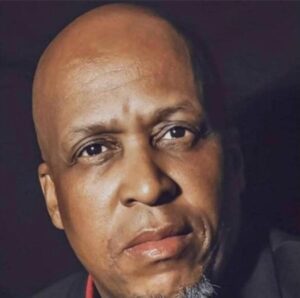
-Political Analyst, Author Freelance Writer
-BTh. (Hons-Status) UWC, MA Systematic Theology cum laude NWU, Ph.D. [Politics & International Affairs] UJ,
-SARChi & CADL [Centre for African Leadership Development] Post-Doctoral Research Fellow



